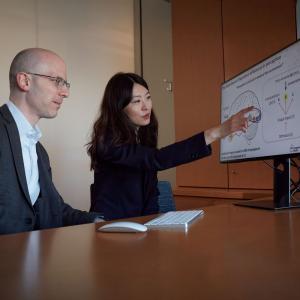This article is part of Many Older Patients Not Getting Recommended Treatment for Early-Stage Bladder Cancer, Study Finds.
Is genetic modeling of bladder cancer still useful in the post–Human Genome Project era? The answer is a resounding yes, according to NYU Langone’s Xue-Ru Wu, MD, the Bruce and Cynthia Sherman Professor of Urological Research and Innovation and vice chair of urological research, in a special supplement on bladder cancer published in 2020 in Clinical Cancer Research by the American Association for Cancer Research.
“We need genetically tractable experimental systems more than ever to validate the biologic potential of combinatorial bladder tumor drivers,” says Dr. Wu, whose research has helped illuminate how non-muscle-invasive bladder tumors form along the receptor tyrosine kinase RAS-PI3K signaling pathway. By interrogating (or dissecting) the effects in mice of systematically deleting individual genes residing on chromosome 9p21, Dr. Wu demonstrated that common mutations must be accompanied by certain collaborative events in order for tumors to arise.
Genetic modeling is also key to better understanding the effects of lifestyle-associated carcinogens, such as tobacco and e-cigarette smoke, and environmental factors, including industrial chemicals found in many manufactured products, he says. In addition, scientists have an ongoing need for tools to evaluate novel diagnostic, treatment, and preventive strategies.
“Going forward, genetic models increasingly will be shaped by sophisticated modeling strategies and methods,” says Dr. Wu. “We will likely prioritize genetic and epigenetic alterations that are highly prevalent in patients, for example, and will increase our use of genome editing techniques—instead of just germline mutations—to create models of bladder cancer.”

